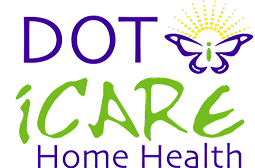Being Safe At Home

When caring for an elderly loved one, we tend to focus on their urgent medical needs (medication, therapy, accessibility devices), comfort, and overall happiness. This is a good thing; but sometimes, in our pursuit of the big picture, we miss the little details which may actually be pretty important. One fine point that cannot be forgotten in elderly patient care is patient safety.
The safety of elderly patients is particularly important for those who are receiving care in the home. While it is a bit of an exaggeration to say that most accidents occur in the home, it is certainly a place where seniors are often injured. It is the first, and best, place to start when improving the safety of your loved one. Here are some important points to consider:
Falls
Trips and falls are the biggest threat to seniors at home. Falls are the leading cause of injury in all Canadians. Almost 30% of seniors will experience a fall each year; 63% of seniors will be injured in a fall at some point. Of seniors in the hospital recovering from an injury, 85% of them were injured in a fall. The numbers tell us exactly what we need to know.[1] [2] Things to look out for include keeping hallways and walkways clear of clutter, making sure wires are not too long and are tucked away. , securing mats and rugs so one cannot trip, providing stable handrails where needed, and using non-slip floor wax. Create a check list for your loved ones home to ensure that you have taken care of any fall risks.
Bathrooms
Water and tiles can combine to make for a potentially dangerous environment. The bathroom should be well-lit when being used. Use non-slip stickers or a rubber bathmat in the shower and the tub to cut down on the risk of slipping. Install bars that can help your loved one raise themselves up. The faucet’s hot/cold labels should be in large print and easy to read; this can avoid someone from being burned by hot water.
Visual Aids
Our eyesight weakens as we get older; this loss of vision can lead to accidents and injuries. Make the home more accommodating. Rooms should be well-lit with easy-to-reach switches. Make sure any important information is in large print. This includes the numbers of the phone, settings on the oven/heater, and settings on the thermostat. Nightlights in the bedrooms and bathrooms are necessary.
Cell Phones
Encourage your loved one to carry a cell phone with them at all times. Ask your wireless provider for a senior friendly model with large display and buttons. They may not always have someone with them; if they fall and cannot reach the land line, help can be just a cell phone call away. Be prepared for some resistance though; many people do not like being permanently tied to a cell phone. Alternatively, suggest a panic button that they can wear around their neck. Older models are Wi-Fi based; newer models offer 3G/ 4G cellular connectivity. Work with them to come up with a solution that addresses their safety and their desires.
One of the best ways to ensure the safety of a senior is to bring in a professional. At iCare Home Health Services for a free Home Safety Check. We also offer a wide variety of packages that will provide top-notch care for seniors in Toronto, Mississauga, Oakville, Milton and Burlington. Our Personal Support at Home package offers a helping hand for everyday life in the home. Our care-giver will work to make your loved one’s home a safe environment. We also offer care for Alzheimer’s and dementia patients. Please contact us today and find out more about our services.

